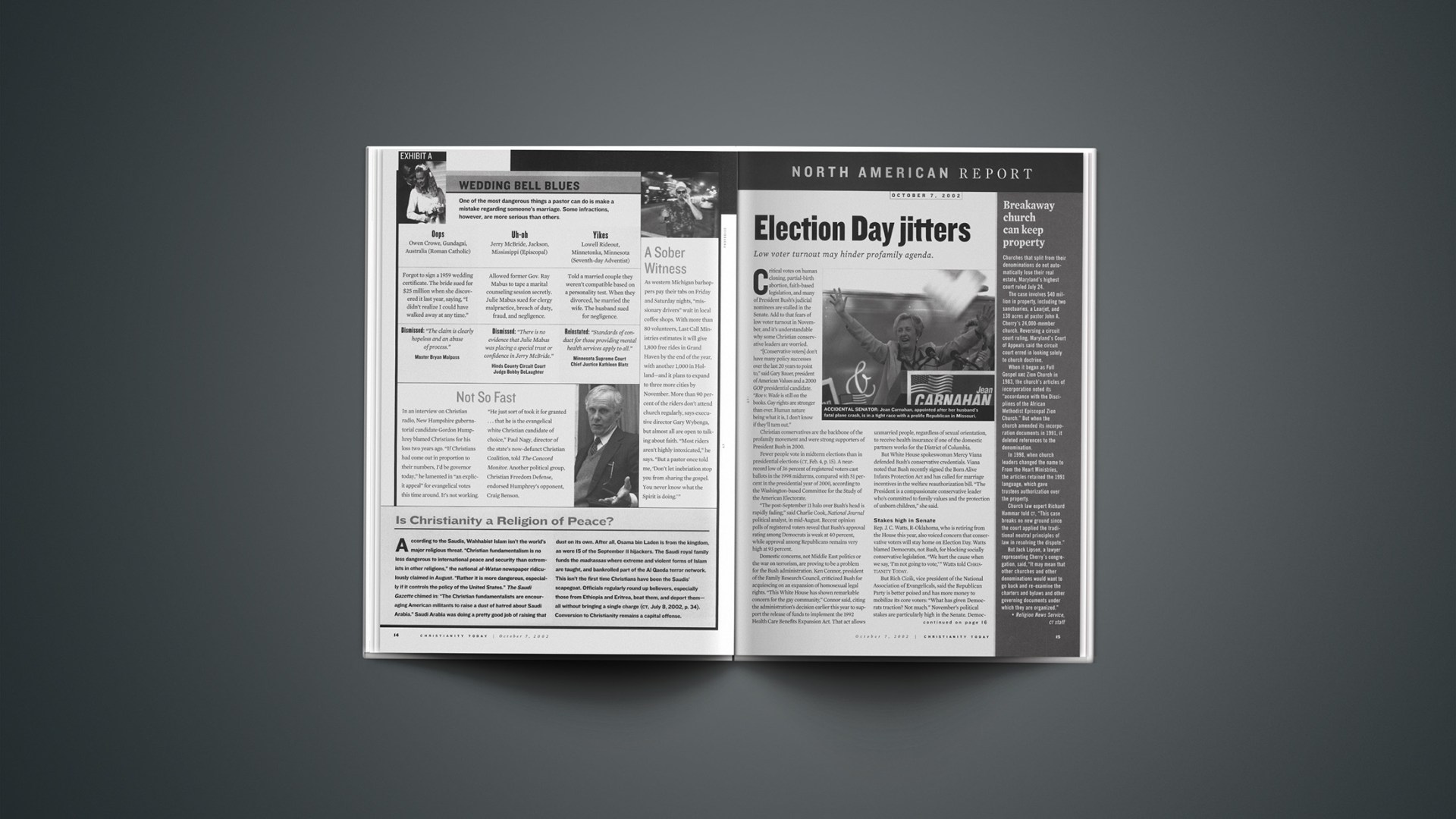Critical votes on human cloning, partial-birth abortion, faith-based legislation, and many of President Bush’s judicial nominees are stalled in the Senate. Add to that fears of low voter turnout in November, and it’s understandable why some Christian conservative leaders are worried.
“[Conservative voters] don’t have many policy successes over the last 20 years to point to,” said Gary Bauer, president of American Values and a 2000 GOP presidential candidate. “Roe v. Wade is still on the books. Gay rights are stronger than ever. Human nature being what it is, I don’t know if they’ll turn out.”
Christian conservatives are the backbone of the profamily movement and were strong supporters of President Bush in 2000.
Fewer people vote in midterm elections than in presidential elections (CT, Feb. 4, p. 15). A near-record low of 36 percent of registered voters cast ballots in the 1998 midterms, compared with 51 percent in the presidential year of 2000, according to the Washington-based Committee for the Study of the American Electorate.
“The post-September 11 halo over Bush’s head is rapidly fading,” said Charlie Cook, National Journal political analyst, in mid-August. Recent opinion polls of registered voters reveal that Bush’s approval rating among Democrats is weak at 40 percent, while approval among Republicans remains very high at 93 percent.
Domestic concerns, not Middle East politics or the war on terrorism, are proving to be a problem for the Bush administration. Ken Connor, president of the Family Research Council, criticized Bush for acquiescing on an expansion of homosexual legal rights. “This White House has shown remarkable concern for the gay community,” Connor said, citing the administration’s decision earlier this year to support the release of funds to implement the 1992 Health Care Benefits Expansion Act. That act allows unmarried people, regardless of sexual orientation, to receive health insurance if one of the domestic partners works for the District of Columbia.
But White House spokeswoman Mercy Viana defended Bush’s conservative credentials. Viana noted that Bush recently signed the Born Alive Infants Protection Act and has called for marriage incentives in the welfare reauthorization bill. “The President is a compassionate conservative leader who’s committed to family values and the protection of unborn children,” she said.
Stakes high in Senate
Rep. J.C. Watts, R-Oklahoma, who is retiring from the House this year, also voiced concern that conservative voters will stay home on Election Day. Watts blamed Democrats, not Bush, for blocking socially conservative legislation. “We hurt the cause when we say, ‘I’m not going to vote,’ ” Watts told Christianity Today.
But Rich Cizik, vice president of the National Association of Evangelicals, said the Republican Party is better poised and has more money to mobilize its core voters: “What has given Democrats traction? Not much.” November’s political stakes are particularly high in the Senate. Democrats hold a 50-49 edge, which Republicans are eager to reverse.
Despite sharp criticism from Senate Republicans, Senate Majority Leader Tom Daschle, D-South Dakota, has locked action on key moral issues. Watts said Daschle has been “a Dr. No on rejecting everything in the social conservative agenda.”
Political observers consider at least eight Senate races to be very competitive. One of the most tightly contested seats is in Missouri, where former Republican Rep. James Talent faces Democratic Sen. Jean Carnahan. She is serving a special two-year appointment after her husband’s death. Patty Skain, executive director of Missouri Right to Life, endorses Talent, whom she describes as “always being a defender of life.”
Talent’s campaign has received between $700,000 and $1.1 million from the Republican Senatorial Campaign Committee, according to an official who asked not to be named.
Carnahan is one of the top candidates for EMILY’s List, which supports prochoice Democratic women. Through July 17, Carnahan’s campaign had received $124,479 from EMILY’s (Early Money Is Like Yeast). The group is likely to spend hundreds of thousands more.
A House divided
In August’s primary election in Georgia, two highly controversial House veterans, Democrat Cynthia McKinney and Republican Bob Barr, lost their elections. McKinney had implied that the Bush administration knew of the September 11 attacks in advance. Barr was among the sharpest critics of former President Bill Clinton. Cizik told CT that he interprets those two defeats as a signal from voters that “headline-grabbers” are at risk and that “competence and character” are essential for victorious candidates.
Many Christian conservatives would be happy to maintain the status quo in the House of Representatives, where Republicans hold a 223-209 advantage over Democrats. Stuart Rothenberg, editor and publisher of the Rothenberg Political Report, estimates that 24 races are a tossup.
Some conservative analysts are optimistic. “The electorate’s not angry,” Cizik told CT. “That means incumbents win.”
Copyright © 2002 Christianity Today. Click for reprint information.
Related Elsewhere
See Christianity Today’s coverage of the midterm elections, “Midterm ExamsGOP, Democrats count on religious vote for congressional campaigns.”
For more information on the 2002 congressional elections see The Washington Post’sElection Archive, The official site of the Congress, and PollingReport.com.










